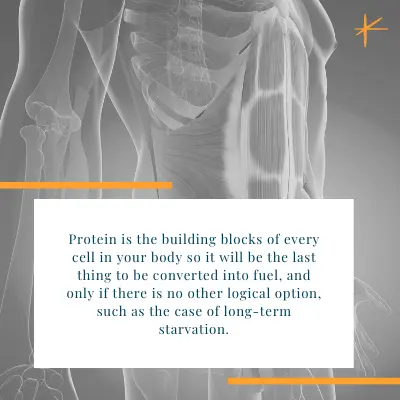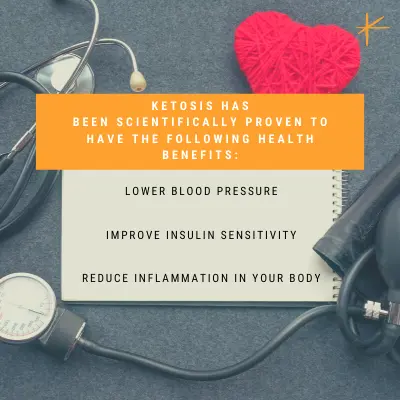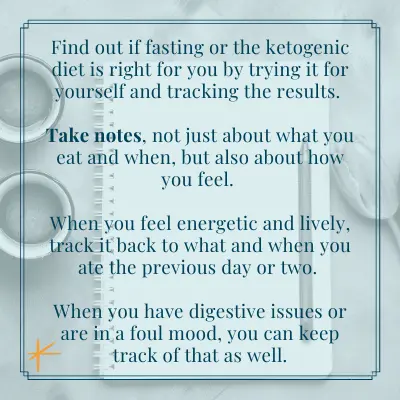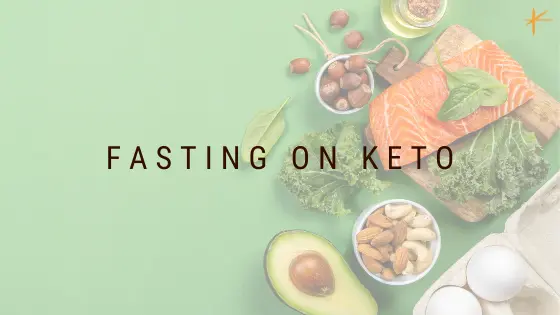Fasting on keto, when done properly, can pair two potentially healthy diets to get even more amazing results.
As a fasting coach, I believe whole-heartedly in the healing power of fasting. But that doesn’t mean I don’t recognize the benefits of other diets and eating patterns. One of the greatest things about fasting is that anyone can do it, regardless of their dietary restrictions and preferences.
The ketogenic diet has been taking the world by storm over the past few years because of the incredible weight loss results that many people have, very soon after transitioning their diet. Keto has many other health benefits as well.
In this article, we’ll take a deep dive into the benefits and risks of fasting on keto.
How Metabolism Works
There are three main macronutrients that your body can convert into the energy needed to function normally. This energy keeps your heart beating and your lungs breathing, not to mention your brain functioning.
The favorite macronutrient is the easiest to convert to energy: carbohydrates.
If carbs are lacking, your body will next turn to fat, which is stored precisely for this purpose. Only in dire emergencies will your body begin to burn protein for fuel.
Protein is the building blocks of every cell in your body so it will be the last thing to be converted into fuel, and only if there is no other logical option, such as the case of long-term starvation.
When you consume carbohydrates, our body produces the hormone insulin. Insulin is responsible for regulating how much energy is needed for immediate use and then directing the rest to storage. As long as you’re consuming carbohydrates, insulin will turn your metabolism to storing mode, effectively turning off your ability to burn fat.

Fasting to Get Into Ketosis
If you don’t consume carbohydrates, insulin won’t be triggered. Instead of storing calories, your body will turn on fat-burning mode. This happens regardless of whether you’re fasting and not consuming any calories at all, or you’re following the Ketogenic diet.
It doesn’t happen instantly, however. Our bodies naturally store glucose in the form of glycogen in our liver and muscles. If you’re conditioned to burning glucose as fuel, as anyone following a non-ketogenic diet would be, it will turn to the stored glycogen before stored fat.
Once there is no other alternative, usually within about 72 hours of either fasting or following a strict ketogenic diet, your body will begin burning your stored fat as fuel. This is called ketosis.
Is Ketosis Safe
Ketosis and the ketogenic diet are controversial subjects when it comes to long term safety because, relative to the diet industry, it’s still a fairly recent trend. That means there aren’t many studies of how it will affect your body 10 years down the line. Information is coming out more regularly now, as Keto proponents have been boosting their health for many years and still seeing results.
The two biggest concerns revolve around nutritional needs and the effects of ketosis itself.
If you’re using fasting as a method of inducing ketosis, your nutritional intake can be managed following any dietary standard. It’s simply the timing of your food that matters. Similarly, fasting for ketosis is time-regulated. You aren’t forcing your body to exist in ketosis for weeks, months, or years at a time. The long-term effects won’t be as pronounced as those who follow the Keto diet.
There is also some confusion about the difference between ketosis and ketoacidosis.
Fasting and Ketosis
When you enter into ketosis, you will have more acid in your blood because ketones are acidic.
This sounds like a negative situation and even a little bit scary, but a healthy body will easily be able to moderate how many ketones are in your blood to prevent it from becoming too acidic. The process is very similar to how a healthy body can regulate sugar levels in your blood. In fact, insulin is also largely responsible for regulating ketones in your blood.
A person with Type 1 diabetes is unable to regulate sugar levels naturally and they’re unable to regulate ketones in their blood naturally. Ketosis can still be a safe nutritional plan for diabetics, but only if they’re also closely monitoring and regulating their insulin levels as with any other diet. Fasting to induce ketosis, however, should only ever be attempted under careful medical supervision and support.
Ketosis vs Ketoacidosis
If your body isn’t producing or responding to insulin properly and you’re dependant on exogenous insulin shots, you won’t be able to efficiently regulate blood sugar or ketones.
Diabetic ketoacidosis is a risk if you forget to take your insulin shot and has nothing to do with nutritional ketosis or fasting. When you eat a normal, balanced meal, glucose is released into your bloodstream, but without insulin, it can’t enter into your cells to be used as energy.
Sustained high blood sugar is extremely dangerous in itself, and without energy, your cells will start to starve. As a survival mechanism, your body will assume starving cells means there is no glucose available. It will turn to ketones to fuel your cells. Unfortunately, if you still don’t introduce insulin, your cells still won’t be able to take in energy.
Eventually, you’ll have extremely high blood sugar levels and so many ketones flooding your body that you’re blood will be so acidic you enter a state called ketoacidosis. When this happens, blood pressure drops, you’ll get very sick, and it’s not unheard of to end up in a coma. People have died from ketoacidosis.
It is a very dangerous, very serious, and very scary condition.
It is also nothing at all like ketosis. Ketoacidosis will only occur when you have no insulin in your body to regulate glucose and ketones. It’s typically only a serious risk for Type 1 diabetics.
Ketones and Brain Health
Whenever you restrict calories, your body has to alter the way it functions in order to keep essential services running. You don’t want to damage your health or ability to function normally in the long-term, just to see some short-term weight loss.
By weight, your brain is only about 2% of your entire body mass, but it’s the most important organ you have. It literally keeps you alive. It’s responsible for every action, conscious or subconscious, including the beating of your heart and the breathing of your lungs. With all this work to do, despite its small size comparatively, it requires about 20% of all the energy you consume.
Not even weight loss is important enough to compromise the health of your brain, so it’s very important to know how to fast and enter ketosis safely.
Your brain needs some glucose to survive, but it can also thrive by using ketones as fuel. Up to 70% of daily requirements for your brain can be ketones, and the remainder can come from glucose produced by your liver, whether you’re actively consuming any carbs or not.
If your brain isn’t used to its main energy supply being ketones, it’ll take a while to adapt. A lot of new Ketogenic diet followers experience brain fog as their body and brain adapt to the new fuel source. Once you’re adapted, however, you can you ketones to power your brain and keep your blood sugar completely steady, whether you’re in a fasted state or consuming a high fat, low-carb diet.
Ketosis and Ketones
When it comes to ketosis and the health of your brain, some very interesting things start to happen.
Being in ketosis, regardless of how you get there, has been shown to increase gamma-aminobutyric acid (GABA) in your brain, which has a calming and focusing effect. This is a logical survival mechanism because your brain wants to make it as easy as possible for you to find a new source of food. Clarity and quick thinking might be critical to your immediate survival, so they’re turned onto overdrive.
This boost to brain health is one reason why the Ketogenic diet has been seen to have positive results for people who suffer from any sort of impairment in their brain, from physical damage to ADHD or even seizures.
Ketosis also increases the production of beta-hydroxybutyrate (Bhb), a ketone that’s able to pass through the blood-brain barrier supplying an efficient source of fuel to our brains.
Bhb has been shown to increase the health and proliferation of mitochondria, or powerhouse, in cells. Brain cells can’t heal themselves the same way most of our other cells do, such as our skin cells. This is why our brain is so carefully protected inside our thick, boney skulls. Degenerative diseases that begin in the brain are usually a result of brain cells not functioning properly or functioning in overdrive for so long that they burn out. If we can improve the function of the mitochondria, we can help protect our brains from degenerative diseases like Parkinson’s and Alzheimer’s.
Fasting and Brain Health
In addition to putting you into a state of ketosis, fasting also impacts the stability of your neural circuits. This is another calming mechanism for your brain. Most of us have a million thoughts racing through our minds at any given time of day, creating stress. Fasting naturally slows the pace down, making your brain more efficient and giving you the ability to focus more clearly on important tasks while relegating “noise” to the background.
Fasting also makes our neurotransmitters more effective as well, reducing the production and making what is produced much more focused and strategic in operation. This cuts down on unnecessary brain activity that can damage cells and wear them out too fast, and instead, protects them for our long-term health.
If you’re already worried about the health of your brain, fasting becomes even more important. When you fast, brain-derived neurotrophic factor (BDNF) is produced, which actually creates new synapses and neurons in your brain. This can improve and rejuvenate your memory, focus, and overall mental health and well-being.
Fasting on Keto Results
Getting into ketosis is great for weight loss, but it can have many other health results as well.
Ketosis has been scientifically proven to have the following health benefits:
- Lower blood pressure
- Improve insulin sensitivity
- Reduce overall inflammation in your body
Fasting has even more health benefits beyond those seen simply by following a Ketogenic diet. Fasting has been shown to clean up and recycle dead, damaged, or dying cells along with other waste, debris, and toxins that are hanging out in your body. This is autophagy.
Fasting will boost the production of your white blood cells, which has a direct and positive impact on your immune system. This will benefit you daily, reducing your chances of catching a common cold or flu virus, or even protecting you against cancer and so-called age-related diseases.

Fasting and Keto Weight Loss
Combining keto and fasting can accelerate your rate of fat loss. If you have a lot of weight to lose to get into a healthier range, this could be a good short-term solution.
On days where you’re following a strict ketogenic diet you don’t need to put yourself into a caloric deficit. You will be entering ketosis nutritionally, so you can keep your calories at your base rate.
On days where you fast for 16 – 20 hours, or before and after a fast of 2 – 3 days, you can eat a more diverse diet because you’ll be entering ketosis through fasting. Providing your body with as many nutrient-dense foods, regardless of carbs, will help you maintain overall health.
By switching up techniques like this, you will also prevent weight loss plateaus. You can also add short term combined protocols, such as the Keto egg fast.
Some people find that they lose a lot of weight very fast. Critics say it’s only water weight or that losing too much weight too fast can be unhealthy. There is some truth to both these concerns, but they are not the entire, end-all truth.
Can you lose weight too fast?
Extreme weight loss in a short time can wreak havoc on your resting metabolic rate (RMR), which is essentially how fast or slow your metabolism burns through energy. Your body is conditioned to expect things to stay the same. Weight gain is usually a slow and gradual process, which allows your body to adapt over time. Sustainable weight loss works the same way.
A great amount of weight that disappears quickly can throw off your hormonal balance, signaling to your metabolism that something is wrong in your environment. There’s not ‘enough fat’ because there’s less than your body has become used to having. It will start to store fat again. This is not the same as going into “starvation mode,” but the results are similar.
When you lose weight due to fasting, it’s a little bit different.
Fasting helps to reset your hormonal balance. Even with a great deal of weight loss, your hormones are communicating more efficiently and less likely to store unnecessary fat.
When you’re intermittent fasting, you may lose weight because you’re reducing caloric intake by removing meals, but that’s not always the case. Many people lose weight even when they don’t reduce calories at all, simply because their bodies are becoming more efficient. If this is the case, there’s little chance that you’ll regain weight unless you return to unhealthy habits.
Similarly, there are a limited number of studies that show that participants who lose significant amounts of weight following a Ketogenic diet maintain their RMR and don’t typically regain the weight.
Tracking Your Fasting Results
One of the best ways to find out if fasting or the ketogenic diet is going to get you the results you want and fit comfortably into your lifestyle is to try it for yourself and track the results.
Changes don’t happen overnight, so I recommend you choose a pattern and stick to it for at least 30 days. It will require dedication, but it’s reasonable and manageable for most people with a little planning.
Creating a plan will help you stick to your efforts when cravings and temptations creep into your life. Developing a consistent routine will make things easier as well. Habits require a lot less will power once they’re well established.
When you start a new routine, you always want to take notes. Not just about what you eat and when, but also about how you feel. If you feel energetic and lively, you can track that back to what and when you ate the previous day or two. When you have digestive issues or are in a foul mood, you can keep track of that as well.
If you’re ready to try fasting, the keto diet, or fasting on keto, my free Fasting Tracker can help. Keep track of all the most important details to quickly and easily analyze your progress to find out what works for you.
Fasting Tracker – Download Your Free Copy Today!

Research and Case Studies
- Ketogenic diet versus ketoacidosis: what determines the influence of ketone bodies on neurons?
- Franziska Spritzler, RD, CDEFranziska Spritzler, RD, CDE, medical review by Dr. Michael Tamber, MD: https://www.dietdoctor.com/low-carb/does-the-brain-need-carbs
- Resting metabolic rate of obese patients under very low calorie ketogenic diet




